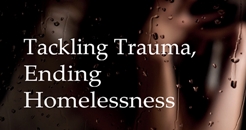 Tackling Trauma, Ending Homelessness
Tackling Trauma, Ending Homelessness
From a report by Oasis Community Housing
Oasis Community Housing is a Christian homelessness charity working across North East England and south London. They help more than 1,000 people every year by providing housing and support and, more fundamentally, a place where they feel they can belong.
In a research report, they evidence the pervasive level of trauma suffered by people experiencing homelessness that the charity’s support staff and others working within the homelessness sector have long been aware of.
It concludes that we cannot hope to end homelessness unless we help address people’s trauma. Here are some of the findings:
94% of people facing homelessness have experienced trauma. While 14% of people surveyed reported a one-off traumatic experience, almost two-thirds (63%) have experienced four or more traumas or trauma over a prolonged period of time.
While these figures indicate a very high prevalence of trauma amongst those with experience of homelessness in England, they are likely an under-reporting.
The types of trauma experienced include:
-
psychological, physical and sexual abuse and neglect as children
-
familial addiction often resulting in bereavement or being taken into local authority care
-
being victims and witnesses of domestic abuse or violent attacks
-
sexual or criminal exploitation
-
the removal of children
-
bereavement
-
physical pain and injury
-
serious illness or disability
-
incarceration
-
fleeing to the UK from abroad to escape persecution and war
-
prolonged separation from family
-
homelessness itself
Those who had experienced homelessness – rather than being at risk of homelessness - were more likely to report five or more experiences of trauma or trauma over a prolonged period. Thus indicating a link between the pervasiveness of traumatic experiences and the likelihood and long-lasting nature of homelessness.
The majority of trauma reported was ‘complex’ and occurred at multiple stages throughout life. The ensuing impacts of trauma on people’s lives are often wide-ranging and devastating, and result in multiple disadvantages including poor mental health, substance misuse and homelessness.
Trauma is often a direct trigger for homelessness. Homelessness itself is a trauma, and increases the likelihood of exposure to further traumas and the negative impacts of trauma. Where complex and unresolved, past trauma and the impacts of this were stated as key factors preventing someone moving on from homelessness. The research identified this complex and often mutually reinforcing relationship between trauma and homelessness as a ‘Catch 22’.
We can only end rough sleeping and homelessness if we tackle trauma. To help address experiences of trauma, we recommend:
-
Establishing minimum standards for the delivery of trauma-informed homelessness support services
-
Developing and rolling out a national trauma-informed training programme in England, mandated for Local Authorities and providers of commissioned homelessness services
-
Local Authorities are required to only commission services supporting people experiencing homelessness that are trauma-informed
-
Developing dedicated mental health pathways for people experiencing homelessness that acknowledge and reflect the challenges posed by the chaos of homelessness and the impact of trauma
-
Ultimately, the cross-Government focus on homelessness, set out in the 'Ending rough sleeping for good' strategy (September 2022), should be backed by an accountable cross-departmental working group that recognises the linkages between trauma and homelessness.
By investing in preventative measures. the result would be fewer households in crisis. These measures would reduce the number of people who become homeless and also, in combination with our other recommendations, improve the ability of those with experiences of trauma to sustain accommodation and make better use of support services.
Read the full report here.
The above recommendations omit the long-term benefits of better parenting - often the root cause of trauma in children. Many churches are helping people experience homelessness but we can move upstream and prevent future homelessness by addressing root causes. Churches can raise the awareness in communities of Adverse Childhood Experiences and help develop community actions by hosting The Resilience Challenge.
Retweet about this article:
From a report by Oasis Community Housing, 20/03/2024